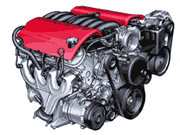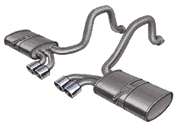GM Press Release: 2001 Corvette Performance
More Performance in the 2001 Corvette
 Note: All information and pictures on this page are courtesy of GM Media Archives.
Note: All information and pictures on this page are courtesy of GM Media Archives.
5.7L LS1 V8
When current Corvette owners are asked what they'd most like to see
in future Corvettes they inevitably say, "more power." So,
2001 Corvette coupe and convertible models with the standard LS1 engine
got a healthy injection of just that.
Horsepower is increased from 345 @ 5,600 rpm to 350 @ 5,600 rpm. Torque increases from 350 lb-ft @ 4,400 rpm to 360 lb-ft @ 4,400 rpm. (375 lb-ft for manuals)
Corvette engineers designed a new composite intake manifold with increased plenum volume and smoother-flowing intake runners. This increased volume of air, delivered to the combustion chamber with less turbulence, allows camshaft lift and overlap to be moderated. The result of the greater air volume is an immediate five-horsepower increase, and the modifications to the camshaft broaden the torque curve yielding a big boost in torque at the low end.
 5.7L LS6 V8
5.7L LS6 V8
At the heart of the new Z06 is an engine that delivers almost 12-percent
more horsepower than the 2000 LS1. Called the LS6, it shares many components
with the LS1, and would look the same externally were it not for its
red engine covers.
The LS6 produces 385 hp @ 6,000 rpm, and torque of 385 lb-ft @ 4,800 rpm. The engine is redlined at 6,500 rpm (versus the LS1's 6,000 rpm redline), and its torque curve is slightly biased toward the upper end where that power will be most appreciated on the track.
LS6 power output is achieved as the result of dozens of refinements to increase volumetric efficiency and maximum rpm. The most important of these refinements are detailed below:
Improved Bay-to-Bay Breathing
The aluminum block casting on the LS6 deletes machined holes in the
LS1 bulkhead and adds cast in "windows" which allow better
bay-to-bay breathing. On the downstroke, the pistons push air back toward
the crankcase, creating backpressure or resistance, and that translates
into parasitic horsepower loss because it resists piston motion. With
the overtravel windows air is allowed to move more freely between crankcase
bays thus relieving the unwanted pressure.
New Pistons
LS6 pistons are cast from high-strength M142 aluminum alloy and reshaped
with a slightly different profile than those in the LS1. In side view,
the LS6 pistons have a slight barrel shape, almost imperceptible to
the naked eye. The new alloy increases engine durability at racetrack
operating levels, while the shape reduces internal mechanical noise.
Increased Compression
The LS6's aluminum cylinder heads are cast with smaller pent-roof combustion
chambers than the LS1. Compression ratio increases from 10.1:1 to 10.5:1,
improving thermal efficiency and increasing horsepower. Intake and exhaust
ports in the LS6 head are refined and more-precisely cast, contributing
to the engine's overall increase in volumetric efficiency.
New High-Profile Camshaft
The LS6-specific, steel-billet camshaft contributes more than any single
piece of hardware to the LS6's horsepower gain. In simple terms, the
cam opens the valves quicker and allows more air to flow into the combustion
chambers. Cam lift increases from the LS1's 12.7 to 13.3 mm.
Stronger Valve Springs
To accommodate valve operation with the high lift/high duration cam,
the LS6's valve springs are stiffer and sturdier. They are made from
the same steel wire as those in the LS1 but are wound tighter for a
higher spring rate.
New Injectors
Additional air flowing into the LS6 heads would serve no purpose without
an equivalent increase in the amount of fuel to take advantage of it.
New injectors increase maximum fuel delivery from the LS1's 3.3 grams/sec
to 3.6 grams/sec - a 10 percent improvement.
New Integral PCV System
The LS6's application on the Corvette Z06 creates additional demands
on the crankcase ventilation system. The Z06 is capable of cornering
at more than 1 lateral "g" requiring a special high-performance
ventilation system.
 |
To prepare the Z06 for full-on driving, the LS6's PCV system is moved into the engine's V, or valley. The unique aluminum valley cover has composite oil separating baffles and PCV plumbing incorporated. All of this reduces oil consumption during high-performance driving - and as an added benefit also reduces the amount of external plumbing, eliminating potential oil leak sources.
Other Powertrain Enhancements
In addition to providing more power and better fuel economy, Corvette
engineers also upgraded the operation and durability of the rest of
the Corvette powertrain in many areas.
New Thin-Wall Cast Iron Exhaust Manifolds
Thin-wall cast iron exhaust manifolds replace the previous stainless
steel manifolds to improve durability - especially on the LS6 engine
given its potential for being involved in sustained high-speed driving.
Stronger Driveshaft
The driveshaft is upgraded from a metal-matrix composite to aluminum
alloy 6061, and it is increased in diameter from 55 to 63 mm. Driveshaft
couplings have also been upgraded on manual-equipped models for additional
strength and durability.
Lighter Automatic Transmission Case
By optimizing the design of the automatic transmission case Corvette
engineers were able to trim some material and reduce thickness in some
areas to reduce mass by 3.3 pounds.
New Clutch
All Corvettes, when equipped with the 6-speed manual transmission (optional
on coupes and convertibles, standard on Z06) feature a revised clutch
with greater clamping power to accommodate increased torque. This new
clutch design also provides for lower pedal effort, making manual-equipped
Corvettes more satisfying to drive.
New Synchronizers
Carbon blocker rings have been installed on all manual transmission
forward gears to provide for smoother shifts and additional robustness.
In the case of the Z06, a car that begs to be driven hard on the racetrack, most of the other components in the drivetrain were optimized for durability and improved performance.
New M12 6-Speed Manual
This transmission is unique to the Z06, is the only transmission available
for that model and is not available on coupe or convertible. It has
more aggressive gearing to increase torque multiplication in most forward
gears, allowing for more rapid acceleration and more usable torque at
higher speeds. The following comparisons serve to illustrate the differences
between the M12 and MM6 (which is optional on coupe and convertible
models):
Gear Ratios
| LS1/MM6 | LS6/M12 | |
| 1st Gear | 2.66:1 | 2.97:1 |
| 2nd Gear | 1.78:1 | 2.07:1 |
| 3rd Gear | 1.30:1 | 1.43:1 |
| 4th Gear | 1.00:1 | 1.00:1 |
| 5th Gear | 0.74:1 | 0.84:1 |
| 6th Gear | 0.50:1 | 0.56:1 |
| Reverse | 2.90:1 | 3.28:1 |
Vehicle Speed @ Redline
| LS1/MM6 | LS6/M12 | |
| 1st Gear | 51 | 48 |
| 2nd Gear | 76 | 69 |
| 3rd Gear | 104 | 100 |
| 4th Gear | 136 | 143 |
| 5th Gear | 175 | 171 |
| 6th Gear | N/A | N/A |
| Reverse | – | – |
Other M12 Modifications
A transmission temperature sensor was added to protect the M12 from
higher thermal stresses. The sensor warns the driver via the Driver
Information Center with a "trans over temp" light if thermal
loads become excessive - meaning that the transmission could be damaged
if not allowed to cool down.
 Titanium Exhaust System
Titanium Exhaust System
To further maximize the breathing capabilities of the LS6, and reduce
vehicle mass significantly a new titanium exhaust system was developed
for the Z06. This marks the first-ever use of titanium in the exhaust
system of a mass-production vehicle. The titanium portion of the Z06's
exhaust system starts just forward of the rear axle then goes over the
top of the axle to the muffler. The entire muffler, all of its internal
parts and exterior skin, the outlet pipes, including the exhaust tips,
are constructed of titanium.
The Z06 muffler is a completely-new design, featuring larger diameter louver tubes inside the mufflers to reduce back pressure and provide less restriction for the exhaust gases flowing through the system. The exhaust tips are different too, with four 3.5-inch diameter tips to visually set the Z06 apart from the standard Corvette.
Titanium offers a lower density than steel, and higher strength than either magnesium or aluminum at all temperatures. It reduces the Z06's weight by 17.6 pounds - a whopping 50 percent reduction over the weight of the stainless steel exhaust system used on the Corvette coupe and convertible. In addition to easing exhaust gas restrictions, reducing mass and looking distinctive, this exhaust system sounds more "aggressive" than that of the standard Corvette. Considerable time and effort went into the design and tuning of the mufflers to ensure an exhaust note that would be unique to the Z06.